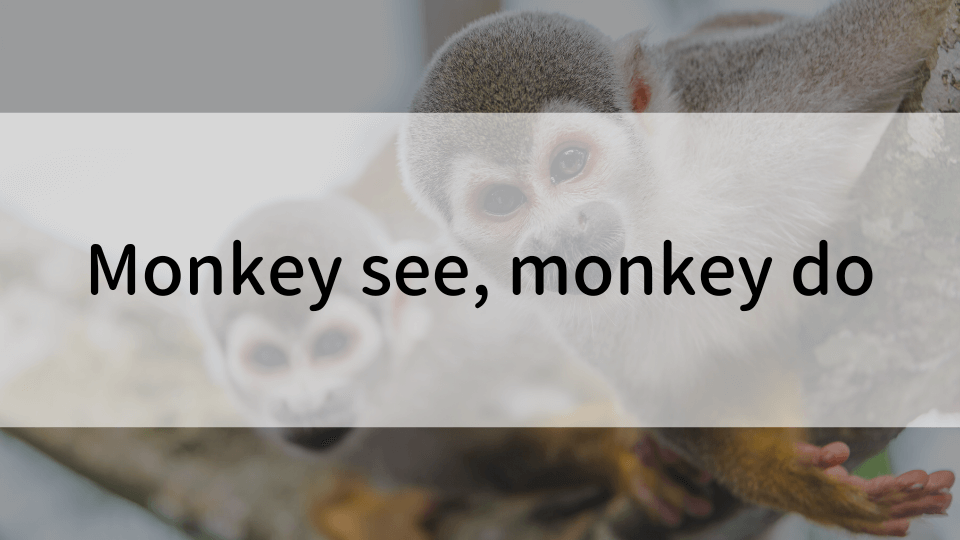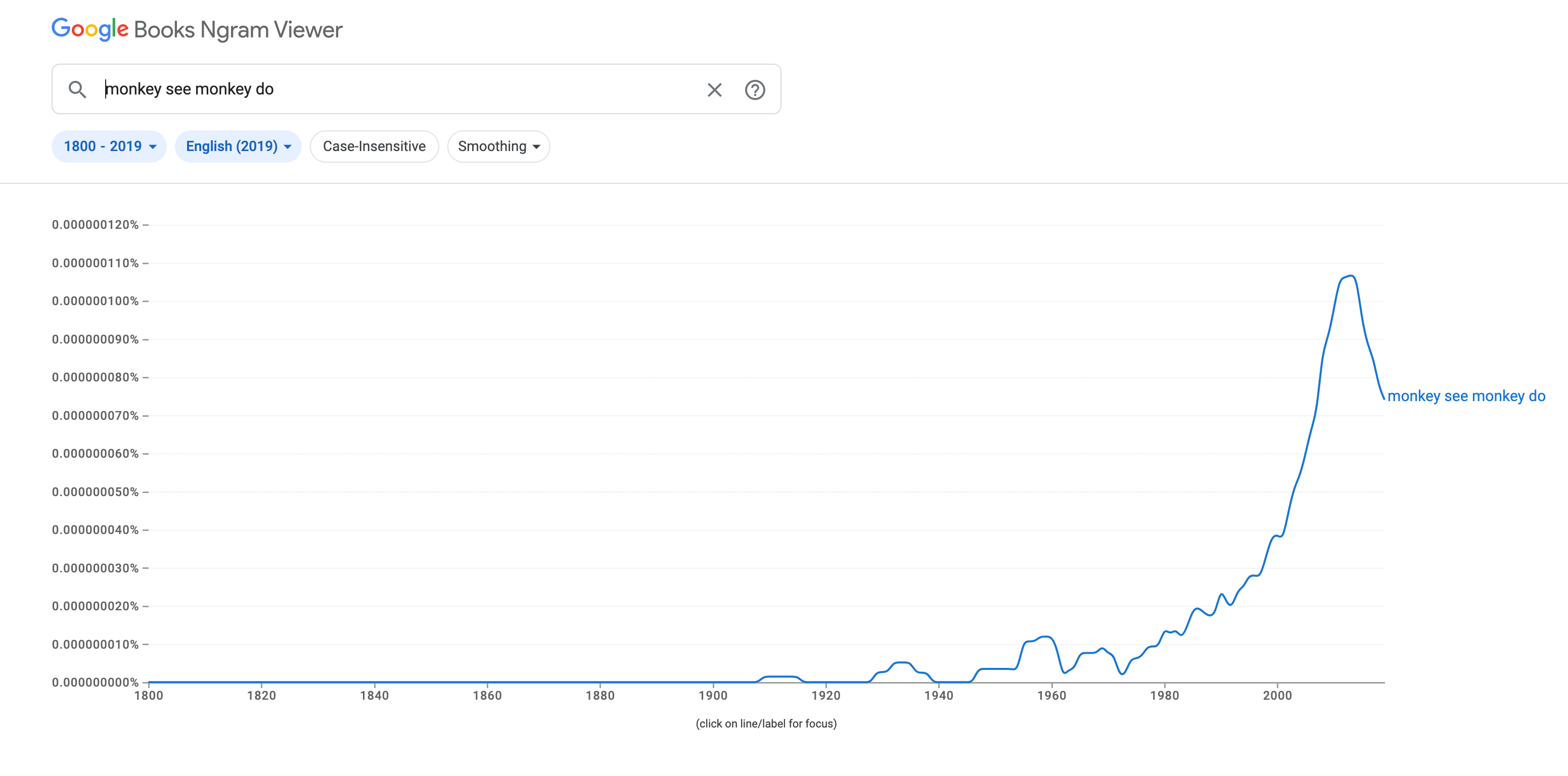「monkey see, monkey do」というフレーズは、結果を考慮せずに他人の行動を真似する人間の傾向を表す時によく使われる慣用句です。
これは、人々が他者の行動や態度を模倣することを指し示し、猿の集団のように互いの行動を、よく考えずに真似する傾向があることを示しています。
「monkey see, monkey do」の使い方と例文
「monkey see, monkey do」は、他人の悪い行動を真似ることを警戒するためだけでなく、良い例に倣うように人々を促すためにも使われる便利な表現です。
たとえば、親は自分の子どもが他の人の悪い行動を真似しないように注意するためにこの表現を使うことがあります。
または、雇用主が従業員に、同僚の安全ではない行動や生産性の低い行動を真似ることを避けるように忠告するためにもこの表現を使うことがあります。
ただし、「monkey (猿)」という言葉を使って人を指す場合には、攻撃的で不適切な解釈をされる可能性があるため、このフレーズを使用する際には気をつけて、特にあまり親しくない人を指す場合には使用を避けた方が良いです。
[例文]
As an English teacher for kids it’s important to always set a good example for my students. Monkey see, monkey do.
(子ども向けの英語講師として、常に生徒に良い手本を示すことが重要です。「Monkey see, monkey do」ですからね。[見た通りに真似をしますからね。])
When I first came to Fukuoka I didn’t understand why everyone was so quiet on trains. Now I’m quiet every time I ride the Nishitetsu line. Monkey see, monkey do I guess.
(福岡に初めて来た時、なぜみんな電車で静かなのか理解できませんでした。今では西鉄に乗るたびに私も静かになります。「Monkey see, monkey do」ですね。[見た通りに真似をするものですね。])
My boss always encourages us to follow the good examples set by our coworkers. Monkey see, monkey do, right?
(上司は常に私たちに、同僚が示す良い手本に倣うように励ましてくれます。「Monkey see, monkey do」ですね。[見た通りに真似をするものですよね。])
「monkey see, monkey do」の使用頻度
「monkey see, monkey do」というフレーズは、下記のGoogle Books Ngram Viewerを見て分かるように、英語で古くからよく使われているな慣用句であり、今でも人気があります。
その使用は時代とともに増加しており、それは人間の行動における模倣の力を示す有用なリマインダーです。
ただし、このフレーズを使用する際には気をつけて、あまりよく知らない人を指す場合には使用を避けることが大切です。
実践的な英語ならケンジントン英会話
ケンジントン英会話では、教科書には載っていない、生きた表現を身に付けられます。
福岡市内の教室やオンラインで、経験豊富でフレンドリーな講師と一緒に英語を学びませんか?
実践的な英語を学びたい方はケンジントン英会話の公式サイトをチェック!
[英語原文]
The phrase “monkey see, monkey do” is a common idiom that describes the human tendency to imitate the behavior of others, often without considering the consequences. It suggests that people may mimic the behaviors and attitudes of others, similar to how monkeys in a group tend to copy one another’s actions without much thought or consideration.
Usage and examples:
“Monkey see, monkey do” is a useful expression in English that can be used both to caution against following the bad examples of others but also to encourage people to follow good examples. For example, parents may use the expression to warn their children not to imitate bad behaviors they may see in others, or employers may use the expression to caution their employees against copying unsafe or unproductive behaviors from their colleagues.
It’s important to note, however, that the use of the word “monkey” in the idiom can be seen as offensive or inappropriate when used to refer to a person and it’s best to be cautious and sensitive when using the phrase, and to avoid using it to refer to people you aren’t particularly close to.
Here are some examples of the expression in use:
- “As an English teacher for kids it’s important to always set a good example for my students. Monkey see, monkey do. “
- “When I first came to Fukuoka I didn’t understand why everyone was so quiet on trains. Now I’m quiet every time I ride the Nishitetsu line. Monkey see, monkey do I guess.”
- “My boss always encourages us to follow the good examples set by our coworkers. Monkey see, monkey do, right?”
Usage through time:
The phrase “monkey see, monkey do” has been a common idiom in English for many years, and it remains popular today as you can see here. Its usage has increased over time, and it is still a useful reminder of the power of imitation in human behavior. However, it’s important to use the phrase sensitively and avoid using it to refer to people you don’t know well.
~*~*~*~ \ Follow me / ~*~*~*~
Instagram : @kensington_eikaiwa
Twitter : @Kensington_Eng
Facebook : @kensingtoneikaiwa
YouTube : KENSINGTON英会話
~*~*~*~*~*~*~*~*~*~*~*~*~*
◆お問い合わせはこちら
ケンジントン英会話:お問い合わせフォーム





































